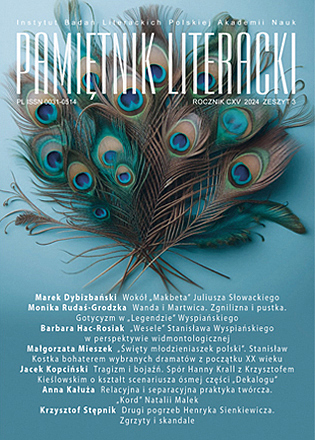„Wesele” Stanisława Wyspiańskiego w perspektywie widmontologicznej
Stanisław Wyspiański’s “Wesele” (“The Wedding”) from the Hauntological Perspective
Author(s): Barbara Hac-RosiakSubject(s): Language and Literature Studies, Studies of Literature, Polish Literature
Published by: Instytut Badań Literackich Polskiej Akademii Nauk
Summary/Abstract: Jacques Derrida’s idea of hauntology holds that all tragic events are in a way enslaved and live in space despite the passing of time, and exert pressure on the generations that follow. Reading Stanisław Wyspiański’s “Wesele” (“The Wedding”) according to this interpretive key is an incentive for understanding this unusual work of Polish literature. Transformation of a straw-wrap into a dramatic figure is a moment of ghost incarnation. The Straw-wrap is a sum total of every ghost from “The Wedding”. The contrast of life and death that the phantom holds contains every private dilemma, experience and disappointment of the work’s protagonists. Wedding guests accept the national history interpreted in the romantic spirit that idealises the ethos of armed uprisings and that distorts the truth about the Galician slaughter. The history that they know is told by a nobleman, not by a peasant. The Straw-wrap dance serves as a travesty of readiness to uprising, a parody of an awkward attempt to repeat what is now passed.
Journal: Pamiętnik Literacki. Czasopismo kwartalne poświęcone historii i krytyce literatury polskiej
- Issue Year: 115/2024
- Issue No: 3
- Page Range: 45-61
- Page Count: 17
- Language: Polish

